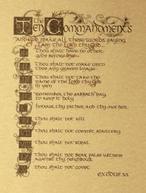 “Now then, just as the Lord promised, he has kept me alive for forty-five years since the time he said this to Moses, while Israel moved about in the wilderness. So here I am today, eighty-five years old! I am still as strong today as the day Moses sent me out; I’m just as vigorous to go out to battle now as I was then. Now give me this hill country that the Lord promised me that day. You yourself heard then that the Anakites were there and their cities were large and fortified, but, the Lord helping me, I will drive them out just as he said.” Caleb served the Lord for many years of his life. Because of his obedience, the Lord granted him strength and health for the majority of his life. But instead of reaching a prefabricated age where he was now supposed to retire and enjoy the rest of his life, he believed something not many of us do—his life was not his own. Earlier in the book of Joshua, Caleb is commended for following the Lord wholeheartedly. Caleb’s vow to serve the Lord wasn’t just for a few years, but for his whole life, until the day he takes his last breath. As Christians, we think we only have to serve the Lord during our working years—the years in which we have the energy and vitality to make money to buy a house, raise our children and acquire the goodies we think will make our lives enjoyable. But in a Christian’s world, retirement doesn’t exist. If our lives are fully devoted to God, that means our lives are too. We don’t get to decide when we stop serving the Lord; He does.
0 Comments
 “‘One thing you lack,’ he said. ‘Go, sell everything you have and give to the poor and you will have treasure in heaven.”‘ Mark10:21 Imagine for a moment you are stuck in a traffic jam on the way to work. You can see the exit just a few miles away, but you simply can’t get there. You know what to do and where to go, you just have to take the necessary steps to get to your destination. The rich young ruler knew what to do, too. I find it hard to believe that Jesus’ words came as a surprise to him. Knowing the Scriptures since he was a young boy means he must have had a knowledge of Scripture for quite some time. Since the Old testament is packed with verses regarding giving to the needy and feeding the poor, the rich man must have understood that one of the characteristics of God was sacrifice. So why couldn’t he commit do doing it? One word stood in his way: Go. It’s easy to go through the motions of the faith by reading the Word, praying and going to church. But its the application of the Word to our daily lives that poses the biggest challenge. The rich man had the steps and knew where to go. He just wouldn’t allow himself to get there. Challenge: Where are you? Are you going through the motions of faith? Are you stuck in traffic, knowing where you need to go but not able to get there? In what way(s) can local church body help you get there?  “‘One thing you lack,’ he said. ‘Go, sell everything you have and give to the poor and you will have treasure in heaven.”‘ Mark10:21. When I think of the word lack, I think about something I don’t have, something I’m missing. In this verse, the lack that Jesus refers to is sacrifice. The rich man could do all the easy stuff, but when it came time to place his total dependence on Christ and allow him to provide for his daily needs, he couldn’t do it. He wore his wealth like a security blanket, wrapping himself in the warmth of his own independence and ability to pay his own way in life. Disciples must be willing to sacrifice everything to follow Jesus. I find it interesting that he already demonstrated this requirement of sacrifice by calling Simon, Andrew, John and James. They,upon hearing Jesus’ call to follow Him, “at once they left their nets and followed him” (Mark 1:18). These four disciples had just as much to lose as the rich young man. All four had fathers who trained them to be fishermen from when they were children so they could make a living for themselves when they grew older. By getting up, they were leaving behind the only trade they knew for a chance to place their trust in someone who promised to provide for them physically and spiritually. Those four disciples sacrificed the security of wealth for a chance to put their trust in the Lord. The rich young man didn’t. Which disciple are you? Challenge: What role does wealth place in your life? Do you cling to your wealth, or would you give it up for a chance to trust in the Lord’s provision?  “Looking at him, Jesus felt a love for him and said to him…”Mark 10:19. Maybe it’s just me, but doesn’t the rich young ruler seem a bit prideful up until this point? He asked Jesus what he has to do to become His disciple. When Jesus answers him, he responds with a flippant “I already know that.” Talk about boldness! The rich young ruler probably thought he could order Jesus around like he did with many of his servants that catered to his every whim. But does Jesus respond with a “Do you know who you are talking to?” response? He models God’s mercy and grace with a compassionate, heartfelt reply. I think Jesus still honored the fact that this young man understood who Jesus was (at least in a superficial way) and acknowledged him as Lord. Jesus still allowed him to become His disciple, if he was willing to sacrifice the one idol that stood between him and Jesus: money. Many times throughout my years of a Christian, I’ve become frustrated with people who, in my estimation, should “get it” when it comes to discipleship. There are moments when I just want to shake certain people and ask “Why aren’t you more mature?” In my arrogance, however, I’ve missed the point that being a disciple means more than just knowing the Word of God, it’s also applying it. Extending compassion to someone who isn’t where I am at spiritually is a good place to start. Challenge: In what ways have you failed to exemplify Christ through a lack of compassion? Is there someone God has placed in you life in which you need to extend more compassion?  “You know the commandments, ‘Do not murder, Do not commit adultery, Do not steal, Do not bear false witness, Do not defraud, Honor your father and mother.’” And he said to Him, “Teacher, I have kept all these things from my youth up.”– Mark 10:17-18 As Christians, we know there is a great cost to being a disciple. It’s easy to keep the commandments that we find we struggle with the least. In the rich young ruler’s life, he found it easy to honor his mother and father, not to steal or lie. It was easy for him because because his wealth and status in the community permitted him to have every luxury at his fingertips. So often we wear our righteousness as a badge, that somehow if people see us keeping the basic tenets of the faith they will know we are Chrisitans. Discipleship is not only about doing the easy things, but doing the more difficult things as well. Challenge: What area of your life do you struggle with the most? If Jesus asked you how you were doing in that area of struggle, what would you say?  “‘Good teacher, what must I do to inherit eternal life? Why do you call me good? no one is good except God alone.”‘ Mark 10:17 Jesus spent His time on earth imitating what He learned from his father. One of the major lessons He learned was the importance of humility. It wasn’t enough He chose to strip Himself of every power He had earned simply for being God’s son, but He chose to not receive the credit for any of the miracles He performed from any of the people He helped. Jesus, a disciple of His Father, deflected the glory from Himself and placed it on the One to whom it belonged. True disciples don’t use their influence to stroke their egos or feed their insecurities. They use their influence to give glory to their Teacher. Challenge: When you minister to others, do you do so out of selfless compassion or out of selfish ambition? What ways can you deflect the glory from yourself and onto God? |
Where I'm featuredWhere I am a member
Click to set custom HTML
Archives
March 2024
Categories |








 RSS Feed
RSS Feed